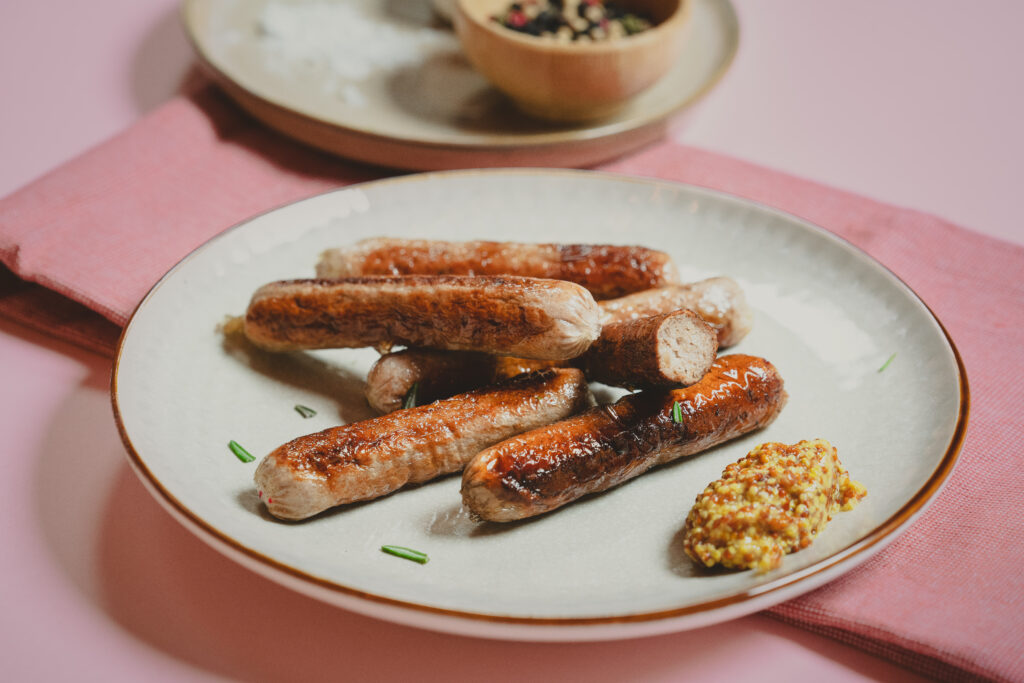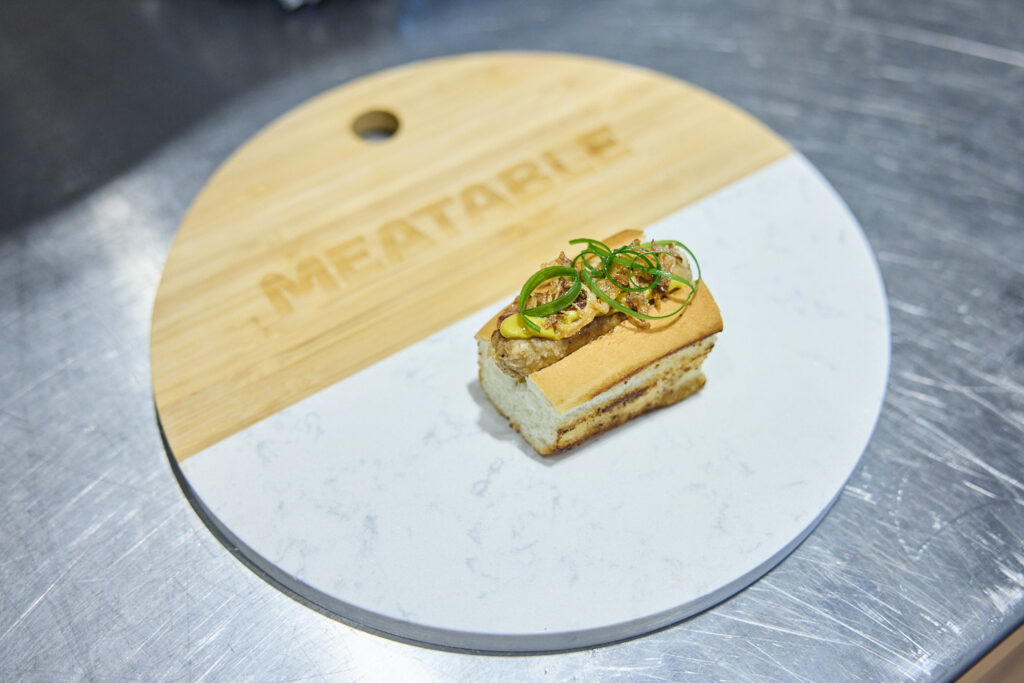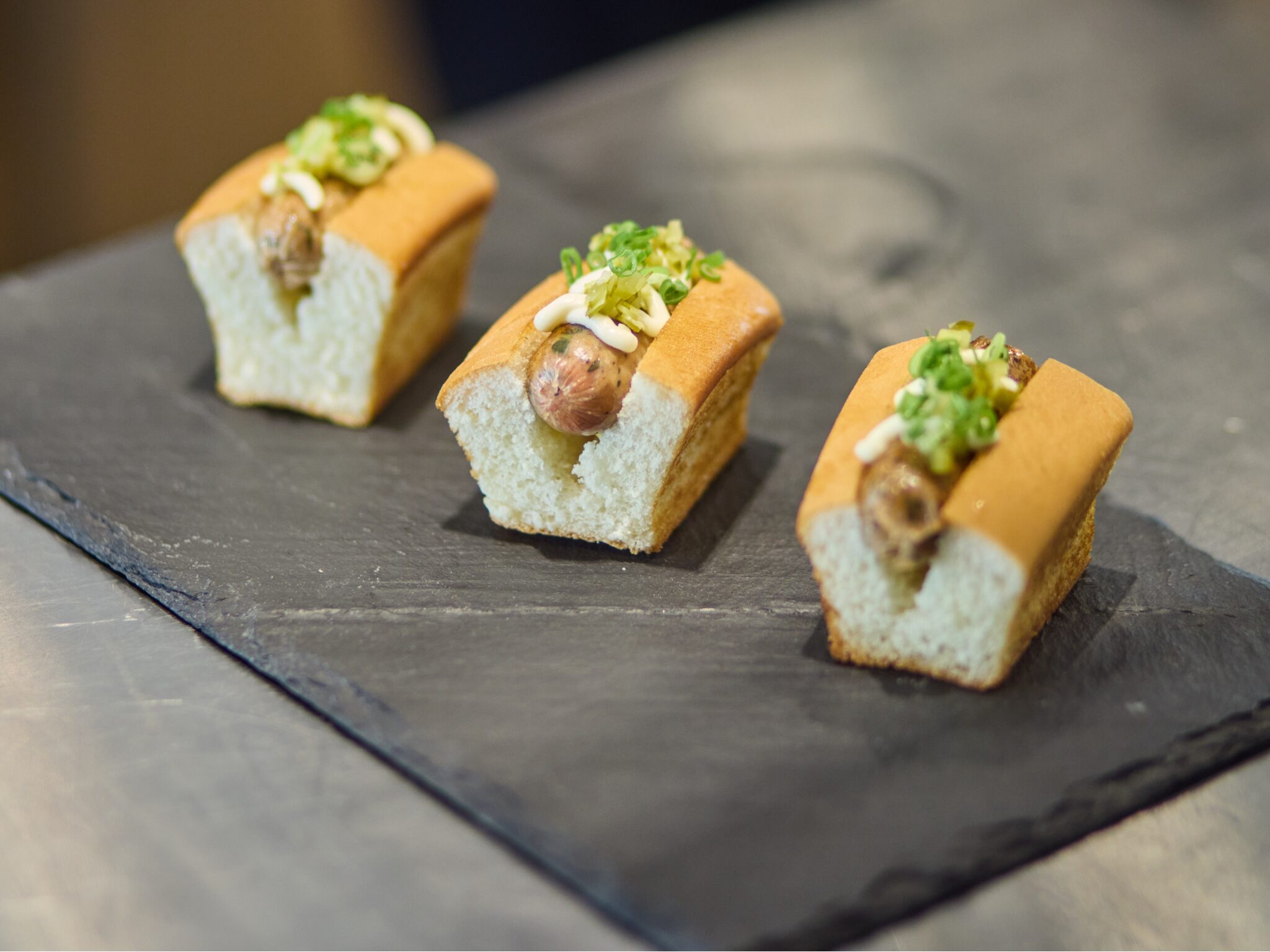Ahead of Singapore Launch, Meatable Can Now Make Cultivated Meat Quicker Than Anyone Else
6 Mins Read
Dutch cultivated meat leader Meatable has cut the production time for its cultivated meat by half, making it the fastest process in the sector. This means its hybrid pork sausages are much cheaper to produce, months before their expected launch in Singapore.
Ahead of its market launch in Singapore later this year, Meatable has achieved a significant breakthrough in its manufacturing capabilities, allowing its patented Opti-ox tech to produce its cultivated pork sausages in just four days, with half as many bioreactors and significantly lower costs.
This means the Dutch startup can make cultivated meat faster than anyone else in the industry, and represents an important step towards the large-scale production and commercialisation of its hybrid pork. Scalability and costs have been the two major barriers to cultivated meat for years, and Meatable says its production milestone – which sees the timeline of the transformation from cell to sausage cut in half – can overcome these challenges.
“The Meatable process centres around the use of pluripotent stem cells [PSCs] with our patented, proprietary opti-ox technology, which enables those cells to differentiate into mature muscle and fat cells – the ingredients for real meat in a fast and cost-efficient process,” Meatable co-founder and chief technology officer Daan Luining told Green Queen. “By reducing cell differentiation time in half, our process now requires nearly half as many bioreactors at scale, cutting both CAPEX and OPEX costs and enabling a more efficient use of production space.
How Meatable makes cultivated meat so quickly

In a chat with Green Queen in August – after a Series B funding round that took its total raised to $95M – Meatable co-founder and CEO Krijn de Nood explained that its Opti-ox technology allows the team to make its products by isolating a single animal cell, without the need for fetal bovine serum.
“While immortalised cell lines are more commonly found in the industry, they require an alteration of the cells to allow them to multiply indefinitely,” he said. The PSCs Luining mentioned above “have the natural ability to keep on multiplying and to do so rapidly”, and at the time, could double in just 24 hours. “The difficulty with using PSCs is that it can be more challenging to change them from stem cells into more specialised cells, such as muscle or fat,” said de Nood.
But by combining these cells with its technology, Meatable was able to produce real muscle and fat cells that are fully differentiated in just eight days. “This is coupled with a perfusion process that allows the team to work in a continuous cycle to generate very high cell densities,” he added. “This means we can grow a lot of cells in our bioreactors, and harvest cultured meat from the reactors continuously. This is a great step forward as it increases productivity and makes the process easy to scale.”
Now, that timeline has been halved, allowing Meatable to produce cultivated pork 60 times faster than the time it takes farmers to rear a pig for pork, and significantly quicker than other cultivated meat processes. “We have been able to create high-quality, fully differentiated cultivated meat with the right level of protein, fat accumulation, and key meat flavours in only four days, a significant reduction in a process that typically takes weeks,” noted Luining. “We are constantly working to improve the efficiency of our process, while also increasing the amount and quality of the fat and muscle tissue in our product.”
Crucially, this drives down production costs too, which represent a key bottleneck for cultivated meat companies. According to Leticia Goncalves, global foods president at ADM (an investor in companies like Good Meat and Believer Meats), cultivated meat needs to reach production costs of $2.92 per lb to be cost-competitive with conventional meat. And while producers have managed to reduce costs by 99% in less than a decade, McKinsey forecasts that it will still take until 2030 for it to reach price parity.
“With this breakthrough, we are able to drive down the costs and work towards producing meat at a competitive price point faster than others in our category,” said Luining. “The breakthrough results in less labour, energy, infrastructure, ingredients, and water used in our process, making us more scalable, cost-efficient, and also more sustainable for the planet.”
Asked how its first products will be priced, he added: “At launch, we are confident our price point will match those for high-end organic meats, and then we plan to ultimately match mass-market pricing. We are optimistic that Meatable will reach price parity with traditional farmed meat in the next few years.”
Meatable looking to capitalise on regulatory progress

Speaking of market launch, Meatable expects to roll out its cultivated pork sausages in mid-2024 in Singapore, where it filed a dossier for regulatory approval last year. It has conducted several rounds of public tastings. These showcased multiple prototypes of its hybrid meat, which is a blend of cultivated pig cells and plant-based ingredients.
Hybrid meat has been touted by investors as the way cultivated meat will enter the market on a broad scale. Speaking to Green Queen last year, Heather Courtney, general partner at Alwyn Capital, said: “It’s likely the only way to make cultivated commercially feasible… as the chances of being able to economically produce 100% cultivated products that can compete on price with commoditised meat are slim to none in the next 10+ years.”
This is echoed by Luining, who confirmed that Meatable’s eventual hybrid sausages will comprise at least 33% of cultivated meat. “This delivers a truly superior flavour and taste experience over plant-based alternatives to satisfy the quality that meat-eating consumers recognize and expect,” he explained. “While our process can result in fully cultivated meat, the speed and scale of production would be limited, and the hybrid approach results in a game-changing product.’
While it eventually wants to get into retail, Meatable’s initial entry into the market will be through restaurant menus in Singapore – as has been the case with all other cultivated meat companies to have launched their products, such as Good Meat in Singapore and the US, and Upside Foods in the latter. And given the regulatory success of these companies in the US, Meatable is eyeing an expansion there in 2025, and is already in talks with the USDA and FDA over the regulatory process.
As for its home continent, things are a little tricky. The EU has the world’s most robust food safety regulations around novel foods, and so far, no company has filed for approval in the bloc. In fact, some countries have been trying to create further barriers towards regulatory clearance for cultivated meat, with Italy having banned its sale and production, and France and Romania looking to do the same.
The Netherlands, for its part, has been much more progressive in its support for these proteins, facilitating a €60M grant for cellular agriculture in 2022, and expressed its support in the EU meeting about cultivated meat, with food quality and agriculture minister Piet Adema saying: “We believe that it is important to support innovations that create production methods for animal proteins complementary to, and not as a substitute to, conventional sustainable production.”
Putting its money where its mouth is, the Dutch government in January became the first EU nation to develop a framework to allow public tasting events of cultivated meat. Meatable has already filed a dossier and is awaiting the green light to sample its pork sausages to consumers in the country.
“Our ultimate goal is to get our products on the plates of consumers all over the world through our future restaurant and retail partners,” said Luining. “Recent regulatory developments have boosted confidence in the industry… We look forward to capitalising on this momentum.”




